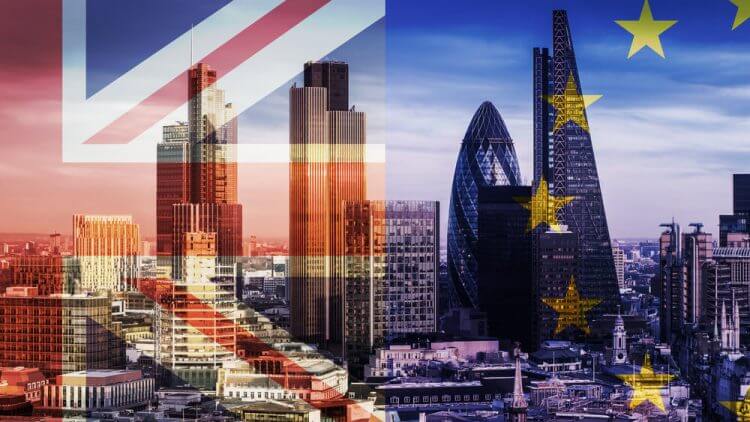Whether you voted remain or are in strong favour of a hard Brexit; there’s no ignoring the uncertainty the UK is faced with as a nation as we plan our upcoming leave from the European Union. From travel to the housing market; Brexit is undoubtedly going to have an impact on all areas of the UK’s economy – we’re just yet to know how significant this impact may be.
One of the many questions the UK are left wondering is how will Brexit affect UK house prices and mortgages? RICS (Royal Institution of Chartered Surveyors) suggests that “uncertainty created by the Brexit process is causing buyers and sellers to sit tight in increasing numbers”. Similarly, many UK residents are also hesitant about travelling abroad having little knowledge of what exactly our current and future situation might mean for us, resulting in people simply; ‘waiting it out’.
Ross Counsell, director at Good Move, the regulated property buyer, gives his thoughts on the current state of the UK housing market stating that “Since the initial vote on 23rd June 2016, the uncertainty surrounding Brexit has made market sentiment quite fickle. The consequence of this is a slowing in house price growth, with the future state of the economy and housing market becoming difficult to predict. Home owners in areas where prices are already stagnating or falling have an incentive to wait and see rather than commit now.”
Current UK Housing Market

At a time when the UK usually sees a traditional spring property revival; the nation is instead lowering their asking prices by 0.8% due to Brexit-imposed anxieties. According to property site Right Move, London saw the most significant falls, closely followed by surrounding boroughs and counties showing the clear affect the uncertainty of Brexit is having on the UK’s economy already. As stated on the official land registry government data website, as of February 2019 the average house price in the UK is £226,234, meaning the current index stands at 118.66. House prices have fallen by 0.8% compared to the previous month; however they are up 0.6% compared to the previous year.
The Bank of England states that the impact of the UK leaving the EU on the housing market could be significant. This is however, based on scenarios that could happen, not necessarily what is going to happen as a result of Brexit. With such uncertainty around the whole concept of Brexit in general, it’s definitely difficult to tell.
Ross went on to say that “The critical point will come when we agree (or fail to agree) an exit deal with the EU. The market could see a recovery if the government can pull off a sensible deal. However the outcome of a ‘no-deal’ scenario is likely to be a fall in house prices. The Bank of England’s governor predicts that in a worst case scenario, prices could fall as much as 33% over three years. We predict that a fall in prices in the wake of a ‘no-deal’ Brexit will be far less dramatic. The scarcity of supply to the market and limited choice for buyers will prop prices up and decrease likelihood of a crash.”
Until a clear deal is established on the ‘final deadline’ of the 31st of October 2019, we can only predict the future. The below figures are 2019 house price predictions.
Experts Make the Following UK House Price Predictions for 2019
- Richard Donnell, property market analysts Hometrack: 3% rise
- Andrew Montlake, mortgage broker Coreco: 1% to 2% rise
- Henry Pryor, housing market commentator: 5% fall
- Miles Shipside, property portal Rightmove: no change
- Andrew Burrell, Capital Economics: 1% rise
- Simon Rubinsohn, Royal Institution of Chartered Surveyors: no change
- Russell Galley, mortgage lender the Halifax: 2% to 4% rise
To gain further insight into the topic, we reached out to property and financial experts to see what their take on the current and potential future situation of the UK housing market is, and what it could look like post-Brexit. Here’s what they had to say:
Adam Cheal – Managing Director at Fletcher Longstaff

“UK house prices have performed better than expected so far this year as supply continues to outweigh uncertainty over Brexit.
According to figures from Halifax, the average price of a house in the UK dropped to £233,181 in March, although still 2.6% higher in the first three months of the year compared with the same period in 2018.
The British housing market has been marked by volatility in recent months, with supply constraints sustaining prices, even though many buyers have been put off by uncertainty over Brexit’s potential effects on property values.
While MPs have voted against no deal, investors and market experts have expressed concern about the potential consequences given it remains the default position if an agreement cannot be reached by the new deadline of 31 October.
Last September, Bank of England governor Mark Carney predicted that a no-deal Brexit scenario could, in the worst case, precipitate a 35% drop in house prices.
Nationwide property price performance has varied massively since the referendum two and a half years ago. London and the south-east, which once drove house price growth, have stagnated, while some areas such as Wales and Northern Ireland have experienced year-on-year increases of more than 5%.”
How Will Brexit Impact London’s Housing Market?
We were also intrigued to know how the UK’s capital may be affected by Brexit, with it having one of the most expensive and fast-paced property markets in the country. Here is Marcus Bradbury Ross from The London Resolution’s thoughts on the subject.
Marcus Bradbury Ross – The London Resolution

“London will still exist PB (post Brexit) and, unless somebody starts building fresh stock at an alarming rate, there will still be the same stock to choose from as before.
Brexit has coincided with the measures put in place by the current Government to stabilise an upwardly spiralling market – hence the apparent stagnation at present. Lending is still dirt cheap, employment is at the highest it has been for a very long time, so most people buying or selling are not having to do so because of crippling finance, as has happened in previous downturns.
There has been a general relaxing of the market as I think the middle range people, the ones upsizing or downsizing, can’t wait another six months while the clowns try to work something out. Our lives have been on hold for too long now.

People are buying and selling because they fancy a change or because they need to upsize (having a family) or downsize (getting rid of family/ wanting to help children on to the property ladder) but the net effect is the same because anything they are buying, if they have had to sell, will not cost them more.
The market is still strong where the markers establishing ‘true’ value; location, type of house, ability to transform, proximity to transport and local facilities etc. are in place – these are site specific and will never alter.
I think we are seeing a chance for the market to recalibrate; where prices start to become more equivalent – so that a two bedroom flat in Zone 2 will be more or less equal, subject to the above markers. It is crazy that prices (GB pounds per square foot) in Herne Hill are a third higher than those in neighbouring Brixton and Clapham.”
What Will Happen to Mortgage Rates Post-Brexit?
When it comes to the areas of the UK housing market set to be hit by the after affects of Brexit, mortgages are an obvious concern. Whether we’re faced with a deal or no deal scenario, this could potentially mean future falls or rises in interest rates depending on the economy. For example, if the economy is suffering post-Brexit and evidently slowing down, then the government may decide to reduce interest rates in hope of encouraging growth and getting the market back on track. However, if inflation becomes an issue then they may also have to raise interest rates as a result.
If interest rates see a rise, then this is likely to have a knock on effect on mortgage rates forcing them to increase as well for anyone not on a fixed rate deal. Consider switching to a fixed rate deal now if you are currently on a variable rate mortgage so you can rest assured your rates aren’t going to increase. It could mean a positive outcome for you if you’re hoping to remortgage or are on a variable rate mortgage and interest rates drop as you will of course, be paying less money or at least have the option to switch to a better deal. All of these potential outcomes depend on the exit deal that will be agreed at the end of the year.
Deal or No Deal? Only Time Will Tell

Although predictions can provide an overall idea of the worst case scenario the UK housing market is set to face post-Brexit, there are also glimmers of hope when you look at the current figures. With many people continuing to buy and sell their properties, and some waiting, the answer simply is; only time will tell. If however, prices do drop by the predicted 33% then this could introduce positives, such as providing young people with an opportunity to get on the property ladder, but it also adds increased uncertainty and slight insecurity for home owners wishing to sell, or those that work in the property sector.
The French President has insisted that October 31st 2019 should be the ‘final, final deadline’ and stated that “I think it is a big mistake to procrastinate.” Until the government decide and confirm what agreement we will be coming to with the EU, we are unfortunately left to wait and see what the outcome will mean for Britain’s economy and housing market.
Sources:
- https://www.theguardian.com/business/2019/mar/18/brexit-property-uk-asking-prices-fall-rightmove
- http://landregistry.data.gov.uk/app/ukhpi
- https://www.rightmove.co.uk/
- www.propertypartner.co
- https://www.moneyadviceservice.org.uk/en/articles/brexit-homes-property-mortgages
- https://www.which.co.uk/news/2019/04/what-will-brexit-mean-for-house-prices/
- https://www.theweek.co.uk/99725/brexit-house-prices-London-and-UK
- https://www.ft.com/content/87b1f284-1452-11e7-80f4-13e067d5072c
- https://www.bbc.co.uk/news/business-46543252
- https://www.ft.com/content/54f5f390-19af-11e9-9e64-d150b3105d21
- https://thenegotiator.co.uk/home-repossessions-increase-after-decades-of-going-down/







